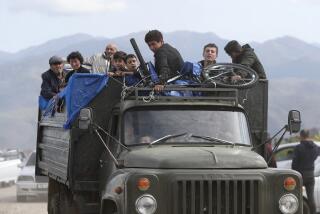Kyrgyz Interior Minister Threatens Force as Protests Spread to Capital
- Share via
MOSCOW — A senior government official in Kyrgyzstan said Wednesday that authorities were prepared to use force against opposition leaders who have taken control of key southern cities, as riot police in the capital broke up protests demanding the resignation of President Askar A. Akayev.
Signaling a significant change in tone from Akayev’s pledge a day earlier that he would not declare a state of emergency, the newly appointed interior minister said that harsh measures could be used against lawbreakers in the week-old crisis that erupted in the wake of disputed parliamentary elections.
“If we allow a split of the country or a civil war, history will not pardon us for it,” Interior Minister Keneshbek Dushebayev said. “The law allows law enforcement agencies to use physical force, special means and authorized weapons to maintain constitutional order,” he said.
Breaking the relative calm that had prevailed in the capital in contrast to the turmoil in the south, an estimated 2,300 pro-democracy protesters marched through Bishkek in two demonstrations Wednesday. Riot police used truncheons and shields and arrested more than 200 demonstrators.
“All of this indicates that the leadership of Kyrgyzstan is more and more leaning towards hard-line policies in dealing with the current crisis.... It has begun to turn towards a forcible scenario,” said Orozbek Moldaliev, head of the SEDEP Research Center in Bishkek.
The former Soviet republic has been rocked by protests since the second round of parliamentary elections March 13. Opposition parties, which have set up independent governing councils in the southern towns of Osh and Jalal-Abad, have alleged that the campaign and balloting were heavily skewed toward Akayev supporters.
Akayev first came to power in 1990 and was reelected by the legislature after independence in 1991. He earned a reputation as a reformer, but since has concentrated his power as the mountainous Central Asian nation has slid further into poverty. Under term limits, he is legally obligated to step down in October, but opponents fear that his potent new majority in parliament may enable him to amend the constitution and remain in office.
Akayev has warned that the political crisis could unleash dormant ethnic hostilities and plunge the nation into civil war. His spokesman railed against the disorder in the south. “As of now, no one has control over the cities of Osh and Jalal-Abad besides criminal forces who run the show there,” Abdil Segizbayev said in a telephone interview.
Segizbayev said Akayev had no intention of acceding to demands for his resignation. “It is up to the people of Kyrgyzstan, and not a bunch of criminal offenders, to decide whether the president should step down or not.”
Opposition and pro-democracy leaders are increasingly worried that Russia, which maintains an air base outside Bishkek as part of a security pact, may send in troops if the crisis spirals into open conflict.
Russian Defense Minister Sergei B. Ivanov said Wednesday that “Kyrgyzstan is Russia’s ally within the Collective Security Agreement. This is something that should not be forgotten.”
His comments were among several indications Wednesday that Russia had abandoned its neutral approach and decided to back Akayev.
“Today, Moscow graphically showed that it is throwing all its weight behind President Akayev.... There has been a real breakthrough of emotions in Moscow,” said Alexei Malashenko, a Central Asia expert at the Carnegie Moscow Center.
The decision, analysts said, seemed to be based on an apparent Russian assessment that Akayev is much stronger than his opponents. Moscow also is concerned about the volatile forces that have been set loose in the impoverished, ethnically mixed south.
Edil Baisalov, head of the Coalition for Democracy and Civil Society, a U.S.-funded network of pro-democracy groups, said he feared that the government could instigate disturbances as a pretext to crack down on the opposition and prolong Akayev’s tenure.
“I think President Akayev knows he has no hope of putting down protests with the local police and the local military, because the local police are not going to use force. Therefore, he will have to call on Russia,” Baisalov said.
Malashenko, however, downplayed the likelihood of Russian military intervention. Instead, he said, Moscow could support Akayev in less tangible but crucial ways -- with cheap loans, or by turning a blind eye if neighboring Uzbekistan launched an incursion that would help suppress the unrest under the guise of defending ethnic Uzbeks in southern Kyrgyzstan.
There were signs that the opposition would consider a compromise short of Akayev’s immediate resignation.
The president could serve out his term until October, some suggested, in exchange for guarantees that the constitution would not be amended and a pledge to hold new parliamentary elections in the fall. Such guarantees might include reform of the Central Election Commission and Supreme Court.
But the upsurge in protests demonstrates that for many opponents, patience is ebbing.
“The most important condition is that there should be a change of power in Kyrgyzstan, which has remained the same since the very disintegration of the Soviet Union,” said Emil Aliev of the Ar-Namys Party. “This time we need real results.”
*
Alexei V. Kuznetsov of The Times’ Moscow Bureau contributed to this report.
More to Read
Sign up for Essential California
The most important California stories and recommendations in your inbox every morning.
You may occasionally receive promotional content from the Los Angeles Times.













